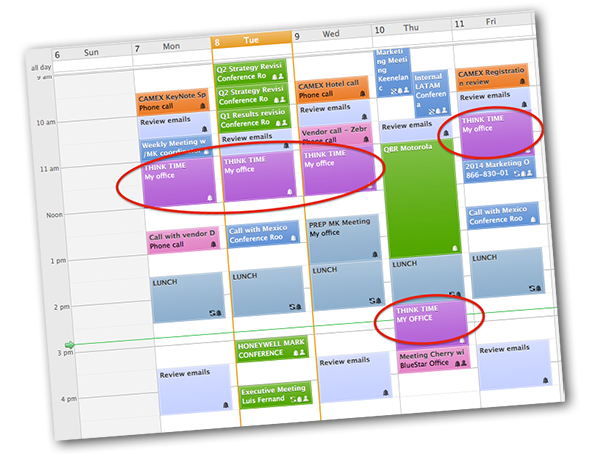Estimated reading time: 3 minutes

Scheduling “Think time” in our daily agendas doesn’t seem like a priority, however it is very important to assign time to do nothing but think so that you can understand and strategize about what is most important to you and your business.
Earlier this month, I was reviewing what I had to complete for our Caribbean Tech Summit that was scheduled for March 19-20. Our keynote speaker Michelle Villalobos had suggested a few interesting topics and I was trying to choose the best topic for her to deliver to our guests. In the past, we had speakers talk about leadership, the future, motivational topics and others; this time I wanted to do something different that everyone would appreciate. I chose the topic: Overcome the Overwhelm – 5 strategies & tactics to do less and accomplish more every single day.
This topic was a hit! Michelle’s simple way of explaining how to organize your time better drew everyone’s interest and kept us all engaged during her 45-minute speech. Even though her speech did not mention “think time” it was considered in her analogy of how she organizes her time; instead of scheduling “think time” in her agenda, she already gave this time a topic of things she wanted to “think” about.
Come to think about it, it is really simple to organize your time. Unfortunately, we get carried away with too many meetings, unexpected calls and the occasional “you got a minute?” interruptions that end up draining valuable time that we could have taken to reflect on what is important to you and your business.
“Think time” should be scheduled every day for at least one hour to 90-minutes to process what is going on around you. This valuable time will help you organize your ideas so that you can develop strategies, organize your team and deliver the necessary communications to your managers or team members. Determining an objective for every call and meeting, will deliver better outcomes and therefore be a better use of your time. There should always be time for strategizing with your team; therefore planning will help you organize your time so that you can take care of what will make a difference in your life and your business.
During our Caribbean Tech Summit, I sat down with several of our guests and vendor partners and came to realize that we all do things that distract us from tailoring our time to better suit our business. We have taken daily activities that are not as important and scaled them to an important status when they should not take so much of our time during the day.
Emails, for example, have become a tedious daily activity that consumes our work schedule because we all make the mistake of checking them constantly. Emails should not be considered urgent. Instructing our managers and team members to address urgent messages in person will also eliminate unnecessary emails and threads. These urgent conversations can be followed up with an email with the specifics; this way you have a written copy of the highlights and can follow up. Emails should be reviewed in blocks; this will minimize lost time spent between tending to an activity that you are focused on and the time that you loose getting distracted with emails before getting back to focus on what you were doing.
Fact: It takes the human brain 2 to 4 times longer to recognize and process information when switching from one task to another. Time lost increases with the complexity of the tasks at hand
~ Harvard University & University of Michigan Studies
Meetings with your team should be direct and with a clear objective. I have been in many meetings that people are reviewing their emails at the same time and they end up not paying enough attention to the overall purpose of the meeting. The lack of attention to the original meeting may generate future meetings that are not focused or lack input. Then what is the purpose of the meeting in the first place?
Overall, the time that you assign to think about your business and how to make improvements is the best time spent. Make sure that you schedule “think time” in your daily schedule from now on and see how strategic thinking will make a difference in your business and in your life.

